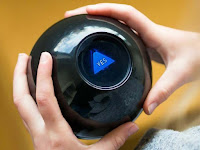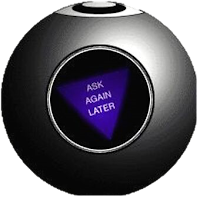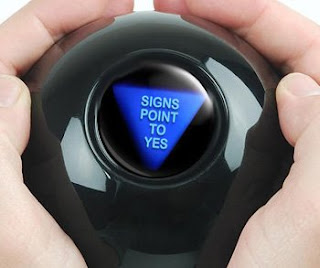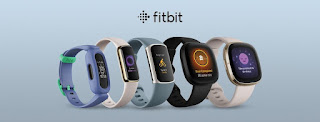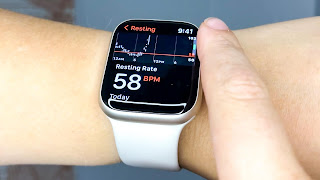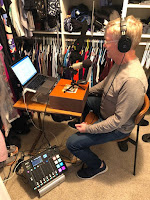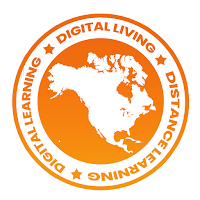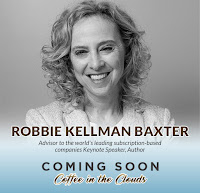If you are reading on a smartphone, use landscape / hold phone sideways.
Oh Magic 8 Ball: Will we go back to the office in 2022?
"Perhaps"
After many years of disruption, life in the USA is slowly returning to normal - except where it is not. Normal may never be normal again. The COVID-19 pandemic has fundamentally changed us, made us question our values and rethink what is important, not important, and what IMPORTANT even means.
What is an office, anyway? And why do we seek to RETURN to it? In 2022 the way we work, the way we communicate, the way we prioritize our time will be different - and will CONTINUE to morph. In 2022 businesses of any size will need to adjust to meet the new demands of PEOPLE, and this will be directly connected to the way we all use and implement technology.
Oh Magic 8 Ball: Will we return to simpler times in 2022?
"YES"
COVID-19 forced us to slow down, which was one of the more positive outcomes. During lockdown, people did begin to appreciate the little things, to enjoy time spent with family, to connect with loved ones, and to appreciate not having to "rush" everywhere. And DOGS and CATS were the big winners during the pandemic, to be sure.
Oh Magic 8 Ball: Will we return to the office, or to a college campus in 2022?
"Perhaps"
The desire for simplicity will extend to work, to school - to everywhere. The term "meetings" or "class" shall never be the same. Business will need technology that just works - every time. And, the people who DO go to an office will simply walk into a room, have their meeting, and get on with their day. Simple, easy to use, high-quality technology which allows people (workers or students) to connect seamlessly with co-workers, classmates and clients with zero fuss will be mandatory.
Oh Magic 8 Ball: Will we still commute to work in 2022?
"NO"
There is a thing now called the 15 minute rule. During COVID-19 people realized what a total waste of time and money commuting to work was. They want to live within 15 minutes of the office - any office - if there even is an office to commute to. It has become widely accepted that we can be productive from anywhere. Workers who no longer wish to commute each day will demand that HYBRID working is a part of their default working arrangement. We shall see a rise in satellite offices, smaller offices located in suburban areas. As of this blog, Sears is converting their distressed mall properties into co-working places, low cost apartments, telemedicine centers, and business development zones. We hung out at "the mall" when we were kids. Now, we shall do it again, as fully-formed adults. Hanging out at the mall will become cool again.
Business shall be conducted from anywhere and everywhere. Gartner believes that by the end of 2023, 40% of companies will use "operations anywhere" to combine virtual and physical interactions with customers and employees.
Oh Magic 8 Ball: Should I Join the NYDLA (now NADLA) in 2022?
"YES"
In the past two years, we have witnessed the rise in telemedicine, the boom of eCommerce, the rise of digital banking, and just about every business type adopting decentralized work practices and processes as a result of the pandemic. Cloud technologies and services, combined with the update of 5G and ever faster internet speeds, will continue to drive the decentralized workforce. 2022 will enable productivity and business continuity from any (every) time zone. Early in the pandemic, we were all scrambling to get headsets, laptops, cameras, even desks and chairs. 2022 will be the year that we all DEMAND work quality via technology. Pro-quality sound, crystal clear video, super fast internet will be table stakes for work in the New Year. We are all now living, learning, working, playing - teaching, training, coaching, mentoring - in the global Cloud Economy. But there is no need to go it alone. There is a support group for the future.
Oh Magic 8 Ball: Will VR take off in 2022?
"My sources say no"
Video is king, and it will continue to dominate as we all move into 2022. Virtual workspaces are coming, but not in the near future. Comfort is key for remote work, and wearing a VR headset that is not lightweight is a deal breaker. VR meetings will happen when the hardware can be designed in a way that is comfortable, lightweight, and easy to wear for hours on end.
Oh Magic 8 Ball: Should I continue to write a Sunday Blog in 2022?
"Reply hazy try again"
[shake shake shake]
"Better not tell you now"
[shake shake shake]
[shake shake shake]
[shake shake shake]

